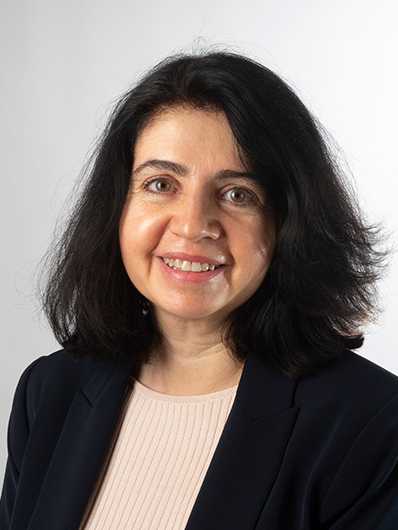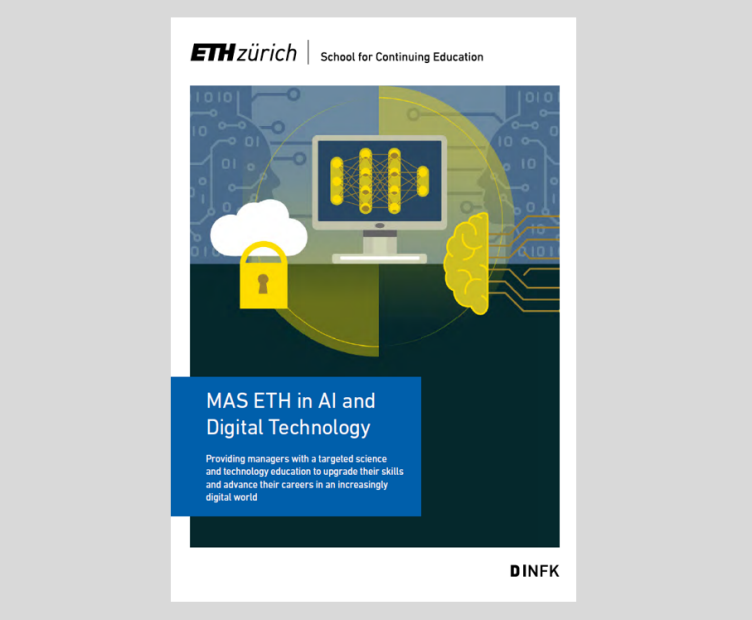MAS Programme
Providing a targeted technical education in digital technology to advance the careers of industry managers
Organisations are changing rapidly to become more digital. With this transformation come both new challenges and new opportunities. Businesses must build interdisciplinary teams to transform software, networks and digital technologies into business applications and platforms. In offering services, companies must also manage significant concerns such as protecting privacy and avoiding bias while using artificial intelligence. Managers without any formal training in these areas need to make critical resource allocation and operational decisions that can have significant impacts on the company's profits and competitiveness. The risks and rewards of this decision making have never been higher. This is where the Master of Advanced Studies in AI and Digital Technology (MAS AID) comes in.
The MAS AID is a targeted technical programme designed for managers who want a better understanding of machine learning, artificial intelligence, cybersecurity and other digital technologies that are rapidly transforming their industry. The aim of the MAS AID is to improve their ability to communicate and collaborate with technology teams and to advance their careers in an increasingly digital world.
The target audience for this program is managers with any educational background and a minimum of five years of professional experience who need to make technology-related decisions in their companies. No prior programming experience is needed. It is appropriate both for people with non-technical backgrounds (business, economics, etc.) and for people with technical backgrounds who have gaps or want to refresh their knowledge with fundamental technical training in these areas.
Graduates will be able to communicate better and develop stronger relationships with IT, software and AI teams. Graduates also will be able to think deeper and more strategically about technology. In turn, this will enable them to extend their existing management skills to take on more challenging leadership roles in interdisciplinary projects and corporate initiatives with significant AI and digital components.
Programme structure
The MAS AID is divided into two parts. The first part consists of three CAS programmes that can be followed independently or as part of the MAS. Each CAS provides science and technology fundamentals in a different area of computer science. The fundamentals are necessary to prepare participants for the more advanced material covered later and, therefore, all three CAS must be completed before starting the second half of the MAS programme.

A schedule with specific dates is usually posted on each programme's webpage approximately 3-4 months before the start. A detailed explanation of each CAS is also available on the CAS webpage:
The second part of the MAS consists of an in-depth AI Project, Cyber Security courses, and seminars covering areas such as the latest research and industry developments, ethics, industry challenges (e.g. explainable AI) and other relevant issues. These courses run concurrently over a six month period. After this, participants write a thesis on a topic of their choice developed in consultation with a thesis supervisor, typically an ETH professor or researcher/lecturer.
Courses are generally conducted in either a block format or blended learning format to minimize time away from work. Classes are usually held at ETH Zentrum campus every other weekend. Each "weekend" consists of one full day (Friday) and one half-day (Saturday morning). Thus, this programme is well suited as a part-time study programme.
Note: the curriculum is reviewed every year to ensure continuous improvement and relevance. As such, the programme content may vary from year to year, especially for the seminar topics.
Practical experience and skill development
The best way to understand a technology is to learn both the theory and the practical implementation together. Throughout the program, we give participants hands-on experience in coding and implementing digital technologies through exercises and projects in addition to teaching the underlying concepts. Foundational skills developed in initial CAS are deepened further in the second half of the programme:
AI Project
The AI Project is designed to provide participants with hands-on experience in the full development cycle of an AI application, from problem definition to deployment. Working in teams, participants will tackle industry-relevant challenges using AI-based methods, gaining practical insights into data preprocessing, model selection, evaluation and analysis, while considering the business impact of each step. Through these complex, real-world problems, participants will develop a deeper understanding of the technical and strategic factors that drive AI success or failure. This practical exercise will not only equip them to bridge the gap between business and technology effectively but also expose them to emerging AI opportunities.
Cyber Security
We will provide an introduction to the fundamentals of cyber security targeted at decision makers who want to understand how cyber security threats can impact their organization, and how they can improve their security posture. Participants will gain an appreciation of the complexity and challenge of building and maintaining secure information systems in a rapidly evolving digital world with advanced persistent threats (APTs), increasingly sophisticated attacks, and mounting costs.
All technical topics will be accompanied by real world examples to showcase their usefulness and by practical exercises providing hands-on experience in applying foundational cyber security principles that will have long term utility even as the technological details change. The goal is to prepare participants to navigate the quickly changing cyber security landscape in their specific work environment.
Master's Thesis
Participants will prepare an independent master’s thesis that allows them to explore a specific area of science and technology that is relevant to their work or personal interest. The thesis topic is freely selectable and can incorporate practical skills such as coding, but it must be approved in advance by the thesis supervisor. Although the thesis may incorporate policy, market information or other types of material to provide context, the final product must be sufficiently rigorous from a science & technology perspective and should be integrative of the material and skills learned during the programme.
Additional information
Tuition fees
The tuition fee of 42,000 CHF is for the entire MAS AID programme, including all component CAS programmes.
If a graduate of one of the three CAS programmes later upgrades to the MAS AID, then the previously paid CAS tuition will be credited towards the MAS AID. Please note that there is no automatic right of admission to the MAS AID. CAS graduates must apply to the MAS AID and their application will be reviewed by the Admission Committee in the same manner as all other MAS applicants.
Admission
Applicants will receive an email notifying them when the admission decision letter is available for download in their eApply account. Admitted applicants do not need to confirm their intention to participate in the programme. A separate email will be sent with instructions on how to set up their ETH email and access their ETH student account (myStudies). All subsequent communication will be via the ETH email account.
Withdrawal
To withdraw, the admitted participant must notify the School for Continuing Education by email (). Withdrawal is subject to the following fees.
- Free of charge: within 30 days from the date of the admission decision letter and before the beginning of the programme.
- CHF 5,000: more than 30 days after the admission date and before the beginning of the programme.
- CHF 42,000: after the start of the programme.
Programme Regulations
The ETH programme regulations governing the MAS in AI & Digital Technology can be downloaded using this link.
Interested in applying?
The next application period for the MAS in AI & Digital Technology (MAS AID) is 1 - 31 May 2026.
Questions
If you need more information, please contact us:

